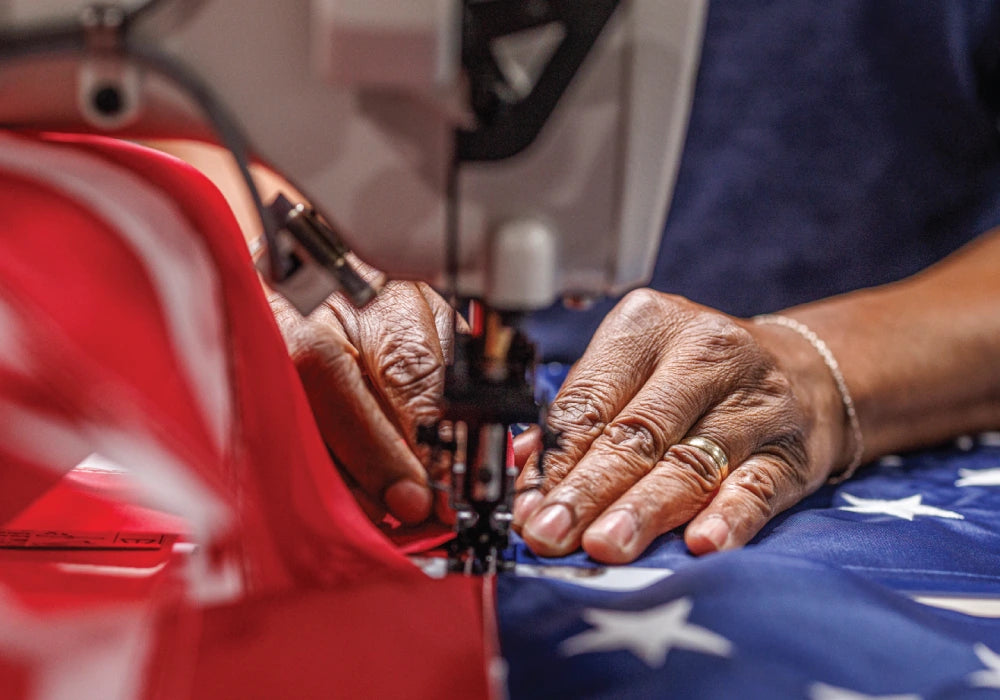March 26

1951
President Harry S. Truman officially adopted the United States Air Force flag. Unchanged since 1951, the flag consists of the coat of arms, 13 white stars and the Air Force Seal, on a blue background. The 13 stars represent the 13 original colonies, the three star grouping at the top portray the three Departments of the National Defense Establishment (Army, Navy, and Air Force). The crest includes the American bald eagle, the cloud formation depicts the creation of a new firmament, and the wreath, composed of six alternate folds of silver and blue, incorporate the colors of the basic shield design. Ultramarine blue and golden yellow, the two dominate colors of the flag, are the official Air Force colors.

1953
American medical researcher Dr. Jonas Salk announced on a national radio show that he has successfully tested a vaccine against poliomyelitis, the virus that causes the crippling disease of polio. In 1952—an epidemic year for polio—there were 58,000 new cases reported in the United States, and more than 3,000 died from the disease. For his work in helping to eradicate the disease, which is known as “infant paralysis” because it mainly affects children, Dr. Salk was celebrated as the great doctor-benefactor of his time.

1997
Following an anonymous tip, police entered a mansion in Rancho Santa Fe, an exclusive suburb of San Diego, California, and discovered 39 victims of a mass suicide. The deceased—21 women and 18 men of varying ages—were all found lying peacefully in matching dark clothes and Nike sneakers and had no noticeable signs of blood or trauma. It was later revealed that the men and women were members of the “Heaven’s Gate” religious cult, lead by Marshall Applewhite and Bonnie Lu Nettles. The leaders preached that suicide would allow them to leave their bodily “containers” and enter an alien spacecraft hidden behind the Hale-Bopp comet.
March 27

1912
Helen Taft, wife of President William Taft, and the Viscountess Chinda, wife of the Japanese ambassador, planted two Yoshino cherry trees on the northern bank of the Potomac River, near the Jefferson Memorial. The event was held in celebration of a gift, by the Japanese government, of 3,020 cherry trees to the U.S. government. In 1934 city commissioners sponsored a three-day celebration of the late March blossoming of the trees, which grew into the annual Cherry Blossom Festival. After World War II, cuttings from Washington’s cherry trees were sent back to Japan to restore the Tokyo collection that was decimated by American bombing attacks during the war.

1939
The University of Oregon defeated The Ohio State University 46–33 to win the first-ever NCAA men’s basketball tournament. "March Madness," as the tournament became known. For the first 12 years of the men’s tournament, only eight teams were invited to participate. That number grew steadily until a 65-team tournament format was unveiled in 2001. In 2011, the field expanded even further, allowing 68 teams to qualify for the "big dance." After four “play-in” games between, now known as the First Four, the tournament breaks into four regions of 16 teams. The winning teams from those regions comprise the Final Four, who meet in that year’s host city to decide the championship.
 .
. 
1964
The strongest earthquake in American history, measuring 9.2 on the Richter scale, slammed southern Alaska, creating a deadly tsunami. Some 131 people were killed and thousands injured. The massive earthquake had its epicenter about 12 miles north of Prince William Sound. Approximately 300,000 square miles of U.S., Canadian, and international territory were affected. Anchorage, Alaska’s largest city, sustained the most property damage, with about 30 blocks of dwellings and commercial buildings damaged or destroyed in the downtown area. Total property damage was estimated in excess of $400 million. The day after the quake, President Lyndon B. Johnson declared Alaska an official disaster area.
March 28
 .
. 
1969
Dwight D. Eisenhower, the 34th president of the United States and one of the most highly regarded American generals of World War II, died in Washington, D.C., at the age of 78. A popular president, he oversaw a period of great economic growth in the United States and deftly navigated the country through increasing Cold War tension on the world stage. In 1961, he retired with his wife, Mamie Doud Eisenhower, to his farm in Gettysburg, Pennsylvania. He was buried on a family plot in Abilene, Kansas.

1979
The worst accident in the history of the U.S. nuclear power industry began when a pressure valve in the Unit-2 reactor at Three Mile Island, near Harrisburg, Pennsylvania, failed to close. Cooling water, contaminated with radiation, drained from the open valve into adjoining buildings, and the core began to dangerously overheat. At the height of the crisis, plant workers were exposed to unhealthy levels of radiation. While more than a hundred thousand people had fled surrounding towns in panic, no one outside Three Mile Island had their health adversely affected by the accident. Nonetheless, the incident greatly eroded the public’s faith in nuclear power.

1984
Bob Irsay, owner of the once-mighty Baltimore Colts, moved the team to Indianapolis. Irsay asked the city of Baltimore to pay for improvements to Memorial Stadium, where the Colts played. Although the two sides told different stories of what went on in the negotiations, it did not go well by any account. The Maryland state legislature passed a law allowing the city of Baltimore to seize the Colts from Irsay. Rather than give up his team, Irsay quickly took a deal offered by the city of Indianapolis and moved the Colts before anyone knew what had happened. Without any sort of public announcement, Irsay hired movers to pack up the team’s offices in Owings Mills, Maryland, in the middle of the night, while the city of Baltimore slept.
March 29


1929
President Herbert Hoover had a phone installed at his desk in the Oval Office of the White House. It took a while to get the line to Hoover’s desk working correctly and the president complained to aides when his son was unable to get through on the Oval Office phone from an outside line. Previously, Hoover had used a phone located in the foyer just outside the office. Telephones and a telephone switchboard had been in use at the White House since 1878, when President Rutherford B. Hayes had the first one installed, but no phone had ever been installed at the president’s desk until Hoover’s administration.

1975
Two months after the signing of the Vietnam peace agreement, the last U.S. combat troops left South Vietnam as Hanoi freed the remaining American prisoners of war held in North Vietnam. In reality, the agreement was little more than a face-saving gesture by the U.S. government. Even before the last American troops departed, the communists violated the cease-fire and by full-scale war had resumed by early 1974. However, America’s direct eight-year intervention in the Vietnam War was at an end. The Vietnam War was the longest and most unpopular foreign war in U.S. history and cost 58,000 American lives. As many as two million Vietnamese soldiers and civilians were killed.


1982
19-year-old North Carolina freshman Michael Jordan made a 16-foot jump shot with 15 seconds left to give the Tar Heels a 63-62 win over Georgetown for the NCAA Tournament championship. "To tell the truth," Jordan told reporters in New Orleans afterward, "I didn't see it go in. I didn't want to look." The winning shot cemented Jordan in the national consciousness. After going 0-6 in the Final Four, the championship was the first for Dean Smith and North Carolina's first since it won its only previous title, in 1957.
March 30

1867
U.S. Secretary of State William H. Seward signed a treaty with Russia for the purchase of Alaska for $7 million. Despite the bargain price of roughly two cents an acre, the Alaskan purchase was ridiculed in Congress and in the press as “Seward’s Folly,” “Seward’s icebox,” and President Andrew Johnson’s “polar bear garden.” Six months later, Alaska was formally handed over from Russia to the United States. Despite a slow start in U.S. settlement, the discovery of gold in 1898 brought a rapid influx of people to the territory, and Alaska, rich in natural resources, has contributed to American prosperity ever since.
1870
Following its ratification by the requisite three-fourths of the states, the 15th Amendment, granting African American men the right to vote, was formally adopted into the U.S. Constitution. Passed by Congress the year before, the amendment reads, “the right of citizens of the United States to vote shall not be denied or abridged by the United States or by any State on account of race, color, or previous condition of servitude.” One day after it was adopted, Thomas Peterson-Mundy of Perth Amboy, New Jersey, became the first African American to vote under the authority of the 15th Amendment.


1981
President Ronald Reagan was shot outside a Washington, D.C. hotel by a deranged drifter named John Hinckley Jr. The president was shot in the left lung, and the .22 caliber bullet just missed his heart. White House Press Secretary James Brady, who nearly died after being shot in the eye, suffered permanent brain damage. He later became an advocate of gun control, and in 1993 Congress passed the “Brady Bill,” which established a five-day waiting period and background checks for prospective gun buyers. John Hinckley was immediately booked on federal charges of attempting to assassinate the president, but eventually found not guilty by reason of insanity.
March 31

1931
Brilliant Notre Dame football coach Knute Rockne (43) and seven others were killed when the wings of their plane broke apart while en route from Kansas City to Los Angeles. During 13 years as head coach, Rockne led Notre Dame to 105 victories, 12 losses, five ties and three consensus national championships. His win percentage of .881 remains the best ever to this day. Considered America's most renowned college football coach, the national outpouring of grief was comparable to the deaths of presidents. Public outrage over the disaster led to a safety revolution that ultimately transformed airline travel worldwide from one of the most dangerous forms of travel to one of the safest.

1943
Oklahoma! began its history-making run on Broadway. The first musical written by the legendary duo Rodgers and Hammerstein, it told the story of farm girl Laurey Williams and her courtship by two rival suitors, cowboy Curly McLain and the sinister and frightening farmhand Jud Fry. It was considered a financial risk due to having no big stars and it was an ambitious experiment in integrating music and dance in service of storytelling rather than spectacle. However, Oklahoma! hit a nerve from the very first moment on opening night. The musical would go on to set a Broadway record of 2,212 performances before finally closing 5 years later.

1985
Wrestlemania I, the inaugural professional wrestling pay-per-view event, was held at Madison Square Garden. Produced by the World Wrestling Federation (WWF, now WWE), Hulk Hogan and Mr. T defeated Paul Orndorff and Roddy Piper in the main event. Celebrity guests included former heavyweight boxing champion Muhammad Ali as referee, baseball player/manager Billy Martin as ring announcer, and musician-actor Liberace as timekeeper.
April 1

1945
Under the command of Lieutenant General Simon B. Buckner Jr., 50,000 US combat troops land on the island of Okinawa. They battled nearly 120,000 Japanese army, militia and labor troops under the command of Lieutenant General Mitsuru Ushijima. While Americans landed without loss of men, they would suffer 12,000 deaths as the Japanese staged a desperate defense of the island that included waves of kamikaze (“divine wind”) air attacks. The Japanese finally surrendered after running out of planes and suffering some 117,000 casualties. Lieutenant General Buckner was killed just three days before the Japanese surrender while Japanese General Ushijima committed ritual suicide upon defeat of his forces.

1970
President Richard Nixon signed the Public Health Cigarette Smoking Act, which banned cigarette ads from airing on television and radio. Nixon, who was an avid pipe smoker, indulging in as many as eight bowls a day, supported the legislation at the increasing insistence of public health advocates. Initially, the tobacco lobby, buoyed by legislators from tobacco-growing areas, succeeded in blocking congressional action for years. However, Big Tobacco came to recognize that an on-air ban would free funds for advertising in alternate media. After the imposition of the television ban, cigarette advertising continued to appear in magazines, newspapers and on billboards.

1972
The first collective players’ strike in Major League Baseball history began. The cause of baseball’s first strike was the expiration of the league’s three-year pension agreement. The Major League Baseball Players Association had made modest requests to increase benefits. However, the owners balked at the proposals, and never took the players’ threat to strike seriously. After 86 games were cancelled, the strike ended twelve days later. Although the players were not paid for the 12 days of the strike, their effort ultimately was a success. Owners agreed to a $500,000 increase in the pension fund and to allow salary arbitration.





